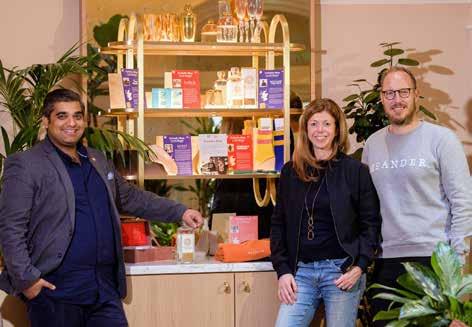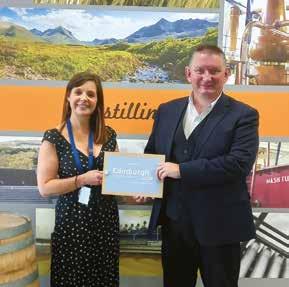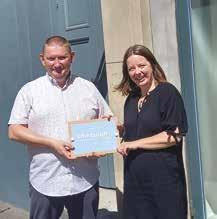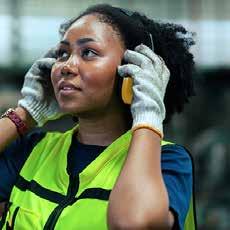and Sustainability



Welcome to the latest edition of Business Comment, which focuses on Innovation and Sustainability.
The enormously difficult combination of challenges facing our economy and our businesses continue to dominate headlines, with runaway inflation top of the pile, closely followed by rising costs and a skills shortage. Businesses will continue to innovate as they navigate the turbulent times in which we are operating, but their ability to invest in a greener and fairer future will be hugely helped by a longerterm, strategic and positive policy environment designed to improve business confidence rather than continuing to lurch from crisis to short-term solution.
So it is encouraging to be able to feature in the magazine some sterling examples of businesses who are innovating and investing in a sustainable future. From the work being done in our construction industry through to how waste management can play a key role in delivering net zero carbon – as well as delivering cost-efficiencies.
In particular, it is heartening to learn of the continued determination of Edinburgh Chamber Business Award winner for innovation, Tronius, to continue to harness the power of good data in guiding the increased use of Electric Vehicles by allowing businesses to better plan charging requirements.

Fascinating too, to read of the efforts being made by the Royal Bank of Scotland in its own journey to net zero and – in particular – its Climate Springboard aimed at helping SMEs on their net zero journeys, which is delivered in an Edinburghbased partnership with the University of Edinburgh and the Edinburgh Climate Change Institute.
Edinburgh International Airport, a vital component in our status as an international city, provides a considered and thoughtful argument for the need for a wider view of sustainability, recognising the need to reduce carbon but also balancing the myriad benefits that aviation already brings to our city as our airport continues to reduce its carbon impact.
Story after story illustrates the determination of our business community to play its part in delivering net zero. Edinburgh Chamber and its network partners will continue to push our policymakers for fairness and support along the way.
20Charging ahead to greener future



Burges Salmon has signed up to the British Property Federation’s (BPF) Net Zero pledge, in line with the firm’s respect for the environment and advocating for positive action to make Net Zero a reality. The BPF Net Zero Pledge calls on BPF members to be net zero carbon across their businesses and assets by 2050 at the latest.
In signing, the firm has committed to the following three core principles:
Setting verifiable net zero targets and plans
Sharing research, knowledge and insight on an open-source basis
Supporting each other, and the wider industry, to accelerate the transition to net zero

The Pledge is intended to work alongside and support existing sector and industry net zero initiatives. The BPF will be encouraging members to work to existing industry standards and evidence progress through existing schemes such as the UN Race to Zero and the BBP Climate Commitment.
Respect for the environment is integral to Burges Salmon’s responsible business commitments and part of stakeholder expectations. The firm is passionate about a Net Zero future, advocating for positive action and collaboration to make this a reality, having pledged to make the business net zero by the end of 2026. The firm has partnered with conservation charity Trees for Life and is one of the founding members of the Net Zero Lawyers Alliance and the Legal Sustainability Alliance.
Burges Salmon’s multi-sector teams deliver Net Zero legal solutions through marketleading expertise and experience in the key sectors that will need to come together to decarbonise including: transport, energy, land & food, and the built environment. With in-depth knowledge of the regulation across the four key sectors, the firm is able to facilitate cross-sector discussions
and are uniquely positioned to advise on the policies, regulation, strategies and projects that will need to be developed and implemented by the private and public sector.
Philip Beer, a partner in Burges Salmon’s Real Estate team and member of the BPF’s Development Committee, says: “Our decision to sign up to the British Property Federation’s Net Zero pledge is about recognising and responding to the needs of our environment. This is in line with the firm’s belief that the scale of change required is huge, particularly for the built environment. We want to rise to the challenge and show genuine leadership by making real and meaningful commitments to drive the transition to net zero.
“Burges Salmon has already made great strides in reviewing its operations and impact on the environment and set stretching targets – we are committed to an approach of emissions reduction first, use of renewables second and use of offsets as the last resort. Signing up to the pledge is in line with the firm working to make a real difference to enable communities, economies and the environment to flourish.”
1. Doctor Seaweed’s Weed & Wonderful
Founded by a Scottish marine biologist, a wide range of seaweed supplements made using organic Hebridean seaweed that is sustainably wild-harvested from pristine Scottish waters.
2. Genevieve Sweeney
Timeless knitwear, made in Scotland with both traditional artisan and innovative knitting techniques that showcase the natural beauty of Scottish spun yarns.
Six Scottish start-up businesses have secured a place in The Curiosity Shop, a new space at Virgin Hotels Edinburgh, dedicated to showcasing sustainable Scottish businesses.

Created in partnership with Virgin StartUp, Virgin’s not-for-profit incubator for entrepreneurs, The Curiosity Shop features a wide range of beautifully crafted Scottish products, all from businesses whose founders have been supported by Virgin StartUp to startup and thrive.
The Curiosity Shop is exclusively available to Virgin Hotels’ guests and offers them the opportunity to discover and support new Scottish brands. All the companies featured in The Curiosity Shop have considered sustainability throughout their manufacturing and packaging processes. From wild-harvested Hebridean seaweed to Scottish spun yarns and hand-crafted gin; The Curiosity Shop is full of Scottish treasures ready to explore.
Andy Fishburn, Managing Director of Virgin StartUp, explains: “Virgin has always been
entrepreneurial at its heart, so it’s great to see Virgin Hotels providing this space to showcase Virgin StartUp companies, particularly those that are making sustainably-driven products right on the doorstep here in Scotland.”
Scott McArdle, General Manager at Virgin Hotels Edinburgh, comments: “We are proud to have a space of the hotel dedicated to championing small Scottish businesses and we have already received great feedback from hotel guests who are enjoying exploring the shop and discovering new sustainable Scottish products. All Virgin Hotels are unique and draw inspiration from their location, so the Curiosity Shop is one of many things we are doing at Virgin Hotels Edinburgh to tell the story of this spectacular country.”
Rutland Square Gin is one of the six businesses featured in the Curiosity Shop. Nishant Sharma, the Founder, says: “We launched Rutland Square Gin last year in November with a vision to make small batch artisan gin that has Scottish spirit with an Indian soul. Each batch is distilled in the heart of Edinburgh, with inspiration from the far east. The support we have received from Virgin StartUp has been brilliant from the beginning and now, to get this opportunity to share our products with international visitors at a landmark new hotel in the city is incredible. We are really excited to see what interest it generates in our products.”
3. Meander Apparel Edinburgh-based outdoor clothing brand. Around 90% of the collection is made using natural or recycled, lowimpact materials.
Small batch craft gin, handcrafted by most talented and experienced master blender in the heart of Edinburgh. Rutland Square Gin makes the world’s first oolong white tea infused Chai Spiced Scottish Gin made using sustainably sourced oolong white tea from Assam, India.
5. Seilich
A small, family-run company based in the Lothians and created by botanist, Dr Sally Gouldstone. Inspired by a passion for Scottish wildlife, the family sell an award-winning range of natural skincare products, made using ingredients grown in their wildflower meadow.
6. Sensi
Launched in 2022 by 25-year-old Jennifer Norrie. Jennifer discovered a love of silk when she tried sleeping on silk pillowslips for the first time and found that her skin was glowier and her hair less frizzy.



Scotland has a huge opportunity to create tens of thousands of jobs in the green energy economy – but the skills system has to adapt quickly and flexibly to ensure the maximum number of people benefit from the shift.
That’s one of the key messages in the latest podcast in The Scotsman’s Sustainable Scotland series, Green Skills: Two Little Words, One Massive Opportunity, we hear from Jenny Macdonald, Sector Development and Skills Planning Manager for the Oil and Gas Transition at Skills Development Scotland and Lauren Braidwood, National Energy Skills Accelerator Project Manager at Energy Transition Zone Ltd.
Lauren Braidwood made the shift herself after nine years in oil and gas.
She said: “Over nine years, I witnessed a few ups and downs in the industry – more than
one downturn. I was a lucky individual, not to lose my job, but it was very hard to watch colleagues and friends being made redundant and going through that anxiety and stress. So often they would say ‘What do I do next?’.
Jenny Macdonald empathises with Lauren’s experience.
She said: “It is really personal in a lot of regions. People know their brother, aunt or uncle is working in the sector and that there are big changes. Industry, government bodies and the skills system must make sure this is as planned as possible, that there are pathways and routes
for people because regions like the North-east have got great jobs that we need for this energy transition.”
Supporting people to make the shift means looking afresh at the skills system and offering a wider range of options.
Listen to the full episode here

Selling a business you have spent a lifetime nurturing and building can be a difficult time both emotionally and from a practical point. When you want to realise the value built up over all those years, what can you do to get the best deal and secure the highest price? We spoke to Anthony Drew of specialist advisors Ogilvie Ross about what you need to think about when the time comes to sell.

BC: Anthony, what is it you do to help sellers secure the best price for their business?
AD: My role is to make sure the management team are confident in what is being said and know how best to say it. If management appears confident and has a good story about their business, then the potential buyer will be more confident in their decision to buy. This also involves working closely with the corporate finance advisors to ensure that there is a common thread running through the information memorandum and the management presentation.

BC: But surely successful business people should be confident communicators and be able to tell a good story about their business.
AD: Absolutely. They do it regularly and 95% of the time they will do a great job but sometimes, the other 5%, can cause issues. I don’t have to tell you but when you are trying to sell your business and speaking to several potential buyers, you cannot afford to have an off day. So, my role is not to teach them how to present or what to say but rather to show them how to be at their best and create the best story about their business.
BC: So how do you do that?
AD: I show them how to have a good conversation with potential buyers, even if it is a formal presentation. In my experience, there are only two parts to any good conversation, what you say and how you say it. To get to the “what”, we work together to identify the key messages for the presentation, which are often a more conversational version of the investment highlights, and then find the evidence which will support these messages. We then top and tail this with a good engaging introduction that often encompasses why this is a great opportunity and a conclusion that reinforces the key messages. For the “how”, I show them what their natural best looks like, taken from a conversation with them, and then how to reproduce this when under pressure.
BC: Is the support you provide just for the management presentation?
AD: No. The ability to communicate well is vital for so many situations but within confines of selling your business, this also extends to informal coffee meetings, question and answer sessions, expert sessions or site visits and if relevant buyer dinners.
I had one CEO who was concerned that he would have to answer the most detailed financial questions. They had a good understanding of the financial strategies and could talk to these but had hired a good CFO to deal with the detail. What they needed was the confidence to know how to deal with these questions how to best use their expert, the CFO.
I had another situation where an oil company was selling some of its refineries and were in the process of arranging buyer visits to one of them. They had thought of everything or at least believed they had until I asked what they were doing during the 90-minute round trip to the refinery and why the person who was going to be on the bus with them knew nothing about the sale. They quickly changed their plans and put a member of the management team along with a briefed refinery expert onto the bus.
AD: Don’t under-estimate the time required to both plan for and hold the management
presentation. I have worked on a couple of transactions were the timetable, which is almost always managed by the corporate advisors, was compressed into the final few weeks before the Management Presentation. The reason used for this was so that the management presentation remained fresh in the minds of the management team. But this caused additional stress on the management team as there were changes being made by the corporate advisors up to the last minute, so nothing was fresh until the final dress rehearsal. This timetable also distracted the management from their day job of running the business. So, don’t leave everything to the last minute.
Anthony Drew is an internationally renowned author and advisor on negotiations and communications strategy. Anthony can be contacted at Ogilvie Ross on 01577 863040 or

As Scotland’s real estate industry grapples with rising costs triggered by increasing inflation and supply chain disruption, businesses face tough decisions to keep their projects on track and on budget. Overcoming these short-term challenges needs to be balanced with staying committed to long-term net-zero carbon ambitions.
Last year, Scotland flew the flag for the climate change crisis with one of our key cities playing host to COP26. Since then, the UK construction industry has faced a multitude of cost pressures and supply chain disruption as the long-term impact of the pandemic begins to sink in, and the fiscal crutches offered by government are removed. All of which has been further exacerbated by the war in Ukraine. These challenges are refocusing business priorities on the need to build resilient supply chains and keep costs under control, whilst still working towards a robust, measurable net-zero ambition. The region is poised to take advantage of developments in offshore renewables, hydrogen hubs and decarbonisation of the railway.
Collaboration is key to maximising all of these net-zero opportunities and there are already a number of joint venture projects in Scotland established between academia, business, and the public sector and general public.
In parallel with developing a deeper understanding of the cost of net-zero construction, the industry needs to get a handle on a new kind of accounting – for carbon.

Project teams across Scotland must treat this in the same way as financial accounting, embedding processes into projects from the outset.
However, accurate data is hard to come by and organisations are in real need of reliable carbon figures now more than ever before. Businesses need to seek advice on how to put proper governance in place to measure and monitor the carbon footprints of their projects or portfolios.
The growing market for offsetting is a particular area of concern as organisations
seek to mitigate carbon footprints through sustainable investments elsewhere. The UK Green Building Council estimates the current cost of carbon to be around £70 per tonne, but the body warns that could hit £120 per tonne or more by the end of this decade. As these costs multiply, the case will strengthen to reduce reliance on offsets.
As an increasing number of companies seek to attain a net-zero position, the financial implications of the rising price of offsets over the short to medium term needs to be accounted for. Some companies are approaching this by establishing a ‘shadow carbon price’ and incorporating this into their projects. Establishing this visibility, and integrating it at an early stage, allows companies to begin to ‘bake in’ the cost of carbon into their projects and smooth the financial transition to net zero over time.
This leads us to see a fundamental shift in the role of the Cost Manager to now control and account for two currencies of construction –cost and carbon.
Through the creation of our new Embodied Carbon Calculator, we can ensure that there is clear integration of these priorities on our clients’ projects. It is a bespoke software tool that enables clients to evaluate the carbon footprint of projects from an early design stage, covering cradle to practical completion of the product and construction process.
Aligned with the Royal Institution of Chartered Surveyors (RICS) New Rules of Measurement 1 (NRM1) and third-party standards such as the UK Green Building Council, as well as benchmarking your project performance against industry targets proposed by LETI, the software fully integrates with our existing benchmarking and cost planning applications,
incorporating the management of carbon as a currency seamlessly with its capital equivalent.
The UK Government has pledged to bring all carbon emissions to net-zero by 2050. We are supporting clients aiming to meet this target through the development of ‘Counting to Zero’ route maps for both new and existing buildings.
The Scottish government has detailed plans to provide over £800 million to the educational sector, over the next 5 years, hence we are already witnessing an increasing demand for the tool within this sector. Carbon offsetting has the potential to make a positive difference, funding projects that would otherwise not go ahead. Our calculator provides transparent reporting on projects where this clarity is increasingly expected by key stakeholders.
There is both an appetite and a need for change when it comes to meeting net zero targets across the construction industry in Scotland, and we are also at a point where we are starting to create innovative solutions to enable us to do so. We now need to be bold, ambitious and embrace a new way of thinking, while working across industry to successfully deliver a more sustainable future for the region.
Turner & Townsend is a global professional services company specialising in programme management, project management, cost and commercial management and advisory across the real estate, infrastructure and natural resources sectors.
With 118 offices in 50 countries, we draw on our extensive global and industry experience to manage risk while maximising value and performance during the construction and operation of our clients’ assets.
To find out more about our Embodied Carbon Calculator visit turnerandtownsend.com/en/news/ embodied-carbon-calculator/

Business: Edinburgh Chamber of Commerce
Title: Project Officer – Circular Economy
Edinburgh and Scotland have set some of the most ambitious targets for the reduction of area-wide emissions in the world, with the Scottish Government having set a net zero target of 2045, and the City of Edinburgh Council aiming to achieve the same by 2030.
Edinburgh is a thriving city and is home to businesses from all industries who are driving innovation and solutions to help tackle the climate crisis and support the city’s net zero target by 2030.
However, we understand that taking action and transitioning to net zero can be challenging and can seem daunting. To help with this I have put together some top tips to help you start your net zero journey.
Measuring your emissions is the first step for any business. This helps to create an emissions baseline which you can use to set reduction targets. At this stage businesses need to consider what direct emissions they produce such as the combustion of fuel in assets the company operates, the emissions from the generation of energy purchased as well as emissions from purchased goods and services.
There are many online tools available to help you calculate your company’s emissions. Check out the Net Zero Edinburgh website for some examples.
Once you have your baseline for emissions companies should look at setting up a green team who will lead on activity. It is important when setting up a green team to make sure people from different departments are represented to ensure that all departments are on board with your net zero journey and are part of discussions and decision making.
After considering your baseline measurement you can begin to create a plan
for the company and start to set targets to reduce your emissions. Committing to a target will help drive and deliver change and show your commitment to becoming net zero to stakeholders and employees.
With a plan and targets in place it’s now time to put everything into action. Focus on reducing emissions from activities your business has direct control over first and then look at reducing your wider emissions. You can begin by starting small and making incremental changes which can increase year on year.
Businesses in Edinburgh can also sign up to the Edinburgh Climate Compact. The Edinburgh Climate Compact is a commitment made by businesses and organisations in Edinburgh to take action to help significantly reduce the city’s carbon emissions. It outlines clear action areas for businesses to focus on and commit to, allowing businesses to tailor their activity to their own particular business. Businesses of all sizes can sign up to the Climate Compact with support available for SMEs.
Lauren RidgleyMost businesses will have emissions associated with their supply chain that they would like to reduce. It is important to work with your supply chain and to be transparent with them on your net zero plans, what your targets are and what actions you are taking. You should also support your supply chain to help them reduce their own emissions.
If you would like further support on starting your net zero journey please find more information and useful resources at netzeroedinburgh.org or email
Virgin Money is the sixth largest bank in the UK, with c.6.5m customers, including 216,000 businesses, an innovative digital platform and a national network of stores, contact centres and relationship managers. We’re committed to supporting our customers with digital first products and services to disrupt the status quo of the personal and SME banking markets.
At Virgin Money, we have a proud heritage of supporting small businesses to help them thrive. Our focus is to equip them with the tools they need to become more productive and grow, while ensuring that they receive the support they need during more difficult times.
The rising cost of doing business has become the most significant concern among our business customers. Unsurprisingly, many are concerned about the impact of rising energy prices on their day-to-day operations. Recent research conducted for the bank has also found that four in ten small business owners are having to take on other roles within the workplace after letting staff go because of the cost-of-living crisis.
To support customers and the wider SME community during this period, we have launched two major initiatives this year to help businesses grow. The first is M-Track, a tool aimed at enabling customers to collate their business data into an online platform to get a single view of their business health to improve productivity and planning, particularly
in times of stress. This tool includes support to manage and project cashflow, which is of rising importance with business owners facing increasing cost pressures.
The second is the Virgin Money Marketplace, where small business banking customers can access different useful services offered by best-in-class digital providers. Alongside M-Track, this is the digital destination where operational gaps can be filled by bringing in additional services from a range of fintech partners. We know that small business owners are time poor and are looking for new ways to navigate the changing world around them, so we’re working hard with innovative fintech partners who are helping us to help our customers run their businesses in the best way possible.
We have also been collaborating with partners to offer further support, including the Virgin Money Levelling Upstarts Programme, which we launched at the start of 2022. This programme matches SMEs from across the UK with MBA and Masters students from
leading universities to provide them with business advice and address productivity issues. It is designed to assist growing businesses to digitise and upskill whilst also providing business leaders of the future with a unique opportunity to put their training into practice. Any small business can apply to take part – they don’t need to be a Virgin Money customer. This year’s activity has seen 40 SMEs and over 200 students successfully participate in the programme, and the application process for the 2023 intake will launch in the coming months.
We’ll remain focused on supporting our customers as much as we can through the more challenging economic conditions we’re all facing. More information on the tools we have available for businesses can be found at uk.virginmoney.com/business.


Josiah Lockhart has taken over as Chief Executive of leading environmental charity Changeworks. In this article he sets out the role Changeworks will play in accelerating the just transition to a low carbon society, and the growth Changeworks is undergoing to get there.
 Josiah Lockhart Chief Executive, Changeworks
Josiah Lockhart Chief Executive, Changeworks
Joining Changeworks, which has 35 years of experience in delivering low carbon living and energy efficiency, as Chief Executive is a great honour. I look forward to delivering our organisational strategy to accelerate the decarbonisation of Scotland’s homes to help fight the climate emergency.
Changeworks has always been at the forefront of moving Scotland towards a low carbon future. We work with government, local authorities, community groups, housing associations, private householders and others to deliver high impact solutions to tackle the climate crisis. Last year we removed 245,500 tonnes of carbon and installed over 4,000 energy efficiency and renewable technology measures.
Changeworks is at a pivotal moment. We are focusing on where we can make the biggest

difference, and are growing our organisation, as well as expanding reach and scaling up services.
Earlier this year, Changeworks launched its strategy for 22-25 which focuses on decarbonising Scotland’s homes. By honing in on the challenge of creating warmer, drier, easier to heat homes, we are maximising our contribution to lower carbon emissions. More energy efficient homes require less energy to heat, and reducing the amount of energy we use is key to Scotland meeting its Net Zero targets.
Heating space and hot water accounts for 79 per cent of energy used in the home, and Scotland has the leakiest homes in Europe. The less heat a property keeps in, the more expensive it is to keep it warm. High energy usage is often a symptom of poor quality building fabric. Measures like external wall insulation can make a big difference.
Tackling the problem of inefficient homes is a big task, and we’re expanding to meet the challenge. This year we’ve created over 40 new jobs across Scotland, including many in our Edinburgh office, with more people coming to join us every week. We’re now the biggest delivery agent for local authority Area-
Based Schemes, and have agreed a threeyear strategic partnership with the Scottish Federation of Housing Associations to support its members.
We also have a long-standing partnership with the City of Edinburgh Council. We provide an energy advice service for Council tenants to help them manage their bills, address any energy issues, and support them to make the changes to make their homes warmer. Changeworks is also part of the Edinburgh Climate Compact and has been heavily involved in the Edinburgh Climate Commission.
Our ambitions for a decarbonised Scotland start here in the capital, just like Changeworks did. We hope you share that ambition, both here and further afield. If you want to join us on this journey to decarbonise Scotland’s homes, contact us at workwithus@changeworks.org.uk to find out how you can support our ambitions, and how we can support yours.

Not long ago the most prevalent response to climate change was to build higher walls, bigger pipes and massive storm tanks. In 2022, things are different.
Providing water and waste water services is energy intensive and we know we need to reduce our own emissions.
We are one of the biggest energy users in Scotland and the water industry as a whole is one of the biggest users in the UK. But why is that?

Water is heavy (1kg per litre), we use a lot of it (1.5billion litres a day in Scotland) and we have thousands of treatment works (1834 waste water works alone.)
On top of this, we invest over £700 million a year on projects, requiring parts and materials from suppliers all over the globe.
Multiplied across water utilities around the world, the scale of the challenge is clear.
Last year, we published our routemap to net zero. We committed to reaching net zero operational emissions by 2030 and net zero total emissions by 2040. Every gram of concrete used and every bolt we buy must be offset without buying carbon credits.
We have made a start on this journey. Since 2006/7, we have halved our emissions. In the last year, we reduced our emissions by 7%,
planted 240,000 trees, installed 1.9GWh of solar capacity and drove 4.9million fewer miles.
But we still have a long way to go and the technologies available to us now will not enable us to meet our targets in the future.
To overcome this, we are working to innovate, gathering experts from a multitude of different backgrounds together to develop new ideas and trial new technologies, bringing them to life faster so they can be adopted quickly.
For example, we have been piloting low carbon concrete, which if successful, can be adopted by us and others to greatly reduce the carbon emissions in the construction sector.
But what advice can we give to others trying to do similar things in their businesses?
In preparing this blog, I spoke to Mark Williams our Head of Sustainability and Climate Change. I want to leave you with what he believes are the four key steps for businesses to follow to become more sustainable and cut emissions.

Step 1: start somewhere - set a boundary for your activities and the emissions that you can control, manage or be responsible for. This will give you a basis for the areas you can focus on.
Step 2: measure - there are many ways of assessing and estimating emissions. Search the web for government or carbon trust sites that have tools and calculators. Establish a baseline and don’t worry about being overly precise. Make a start and improve the accuracy over time. Use this to understand and target where the biggest opportunities are within the boundary that you set in step 1.
Step 3: plan and scope your actions - what can you do to reduce emissions? - where can you eliminate emissions from your activities? Track your progress as part of a plan and report it annually against the original baseline to understand what works well, what needs to change and what more you can do.
Step 4: repeat steps 1-3 until you get to net zero.
Find out more about Scottish Water’s Net Zero Emissions Routemap here: scottishwaternetzero.co.uk

As Scotland’s renewables industry continues to evolve, Wright, Johnston & Mackenzie LLP’s 2022 renewable energy conference is set to be one of the key networking events of the year for industry leaders.

Nicola Martin Partner, Wright, Johnston & Mackenzie LLP


Last year’s event was a huge success, with over 100 individuals at the core of Scotland’s renewable energy sector gathering to discuss the challenges we collectively face, and how we can work together to be as proactive as possible as an industry.
Our 2021 conference coincided with COP26’s official Day of Energy, but the conversation around energy has moved on considerably since then.
The war in Ukraine has caused severe energy uncertainty and put a focus on the sector’s role in fulfilling long-term domestic energy security. Achieving net-zero continues to be a challenge, so it’s important the renewables sector can rise to the occasion and prove itself again as the most viable investment option.
Our conference will act as an opportunity for industry leaders to gather and discuss three key themes - Repower, Recharge and Rethink,
coming together to create a path through the fresh challenges that lie ahead.
A number of renewable projects that commenced in the late '90s are approaching the end of their life span and developers know that repowering is their only option. It is not an if but when for these high-level investments. Calculations are being made in the background as to when and how a site should be repowered and there is no one size fits all approach.
The National Grid says battery storage technologies will play “an increasingly pivotal role between green energy supplies and responding to electricity demands” with reports showing a surge of projects in the pipeline around the UK. As a sector we still await how it will present itself, either as complimentary to, or in competition of the growth in green hydrogen production.
Co-location of renewable energy generation, the creation of energy parks with close involvement of the local community, habitat
enhancement and futureproofing of sites with local stakeholders at heart are ways forward that are being explored. Technologies relating to aviation lighting and the approach of the MoD and Scottish Government to the Eskdalemuir Seismic Array are continuing to evolve and engage the industry.
Like a turbine, the renewable sector relies on the environment around it. The content of the soon to be adopted NPF4 and OWPS Update will be highly significant in the navigation of the prevailing winds of economic, political, and legal change. These must be harnessed by an industry that will play a major role in making Scotland energy secure, while upholding our collective duty to reach net-zero.
Find out more about our annual seminar, being held on Thursday 10 November at the Royal Concert Hall in Glasgow, and book your free place by emailing events@wjm.co.uk wjm.co.uk

When it comes to combatting climate change, we find ourselves at a crossroad. Are we truly ready to abandon the hope of avoiding catastrophic impacts by curtailing global warming to 1.5 degrees? And regardless of how we answer that question, are we doing enough to prepare for the impacts we are already facing?
Together, we are facing an enormous challenge, and there is a dangerous likelihood that at this rate, we won't achieve the Paris Climate Agreement. But we also know that if we admit defeat now, we'll be in a much worse position in 2030 (and 2050). Every fraction of a degree counts, so we should be doing everything we can to try to reach this goal, despite the long odds.
So, what needs to happen to give us a chance to not exceed 1.5 degrees of global warming and what role does the engineering sector need to play in making this possible? Here at Arcadis, we have a clear message on this front. We know what we need to do and where we need to do it; the next step is the how. To catalyze real progress on climate action, we need much better data about the sustainability performances of our cities, because each city has its own unique sustainability challenges to overcome.
Only custom-tailored approaches can help cities take advantage of unique opportunities to mitigate climate change in their local geography and help their citizens adapt to the unique challenges climate change will bring them.
Take for example the Arcadis Sustainable Cities Index 2022 (SCI). Ranking 100 of the world’s leading cities, the SCI examines cities across three pillars of sustainability: planet, people and profit. And although each pillar is weighted equally, we see from the SCI findings that a city can be dominant within a pillar, but still falls in the overall ranking. It is the combination of each pillar that determines how well a city performs overall. This proves that a granular level of data on cities is necessary to create practical action in cities to combat climate change. Though all three factors are weighted equally in the rankings, an intriguing result is the fact that the data shows that putting the planet and people first is a more reliable road to prosperity than putting
profit first, as long as there is some profit to finance the necessary progress. Of the 20 cities at the top of the SCI, seven rank in the top ten for Planet and three rank in the top ten for People. The lesson we can take away is that focusing on planet and people solutions can lead to economic payoff and growth, preparing a city to succeed in rising sustainable economies of the future.
We can be proud that Edinburgh ranks well across the whole index with top twenty scores in both Planet and People. It places a very commendable 18th overall (12th in Europe).
Edinburgh’s transport infrastructure is high quality and accessible to its citizens. However, it does lack sustainability, with particular weaknesses around its ridesharing fleet and bicycle infrastructure which is the worst in the UK. It is however the UK’s least congested city.
Energy & environment
Edinburgh has the UK’s cleanest air, its lowest environmental exposure and most accessible green spaces. It does however require significant investment in its energy mix and energy efficiency both of which are notable weaknesses, by UK standards and internationally. That puts its emissions on a par with Macao, and only just above Houston.
We can clearly see that the challenges faced by each city are unique to the region. Two cities with vastly different climates and two very different approaches to becoming sustainable can therefore rank close to each other in the overall SCI ranking, while still having room for improvement in individual pillars. By exploring what each city is doing well, cities can learn from one another and be inspired to find new ways to improve their own performance.
You can learn much more about the sustainability performances of 100 of the world’s cities by downloading the Arcadis Sustainable Cities Index 2022 at www.arcadis.com
Harvey Nichols, Edinburgh is delighted to announce the appointment of Richard Morris as the new General Manager. Following the retirement of Louise Masson, Richard will now take the reins of Scotland’s only Harvey Nichols as it continues to forge a path for luxury retail in the Scottish capital.

A leading designer destination, the store boasts five floors dedicated to luxury fashion, beauty, food, and wine. Offering an unrivalled shopping and dining experience, Harvey Nichols sources the most desirable designer brands and has been widely recognised as rejuvenating the retail landscape in Edinburgh under the management of Gordon Drummond 20 years ago.
Richard’s career in retail spans nearly two decades. Having previously working for supermarket giants ASDA and M&S, he joined Harvey Nichols over 15 years ago. Initially working for the Birmingham store as Finance & Operations Manager, Richard was instrumental in the opening of the new format store in the Mailbox to be a digital-ready and designerled shopping destination. He subsequently moved to the role of Retail Operations Manager
followed by General Manager in Birmingham before moving to Edinburgh.
Richard Morris, General Manager: “I’m hugely excited to be embarking on this new opportunity with Harvey Nichols. I look forward to forging new partnerships and collaborating with the business community as we work together to ensure Edinburgh continues to excel as a retail, business and tourist destination.”

Richard is delighted to announce he will be joining the Essential Edinburgh board.
To connect with Richard email richard.morris@harveynichols.com.
The idea of the Circular Economy is widely discussed. But do you really understand what it means? The Ellen Macarthur Foundation defines it as “based on three principles, driven by design:

Eliminate waste and pollution;
Circulate products and materials (at their highest value);
Regenerate nature.
It is underpinned by a transition to renewable energy and materials. A circular economy decouples economic activity from the consumption of finite resources. It is a resilient system that is good for business, people and the environment.”
What does this mean in practice? EALA Impacts
CIC is a not-for-profit construction consultancy. Fundamental to our approach is that we audit buildings to help owners understand what to do to improve the sustainable impacts. One way we do this is to list out all the parts being removed from a building during refurbishment or demolition and set out their value in social,
environmental, and financial terms. Doing so illustrates that ‘one person’s trash is another person’s treasure’. Then we suggest uses for the materials so they do the most good and retain the most value. That might be re-use on the same building, or a nearby building, or refurbished and used elsewhere.
Doing so reduces the need for new things. New materials mean the extraction of limited resources from the environment, use scarce water, and cause carbon emissions. Construction of new buildings accounts for 15% of carbon emissions, and 40% of materials extracted are for construction. By re-using what we already have we can reduce this.
Beyond this, the really powerful thing the Circular Economy can do is change our relationship with materials at a fundamental level. It reminds us of the value of objects, of the resources that go into them and the craft and labour of the people who make and maintain them. It can support regenerative industries like haberdashers, tailors, and boiler maintenance engineers; trades which don’t have boom-and-bust business models and
Richard Morrisencourage localism. It preserves the patina and story of our physical things, emphasising our communal history and sense of community.
EALA Impacts are helping local authorities, theatre owners, and housing groups to make the most of their existing buildings by auditing, elevating, and celebrating them. In doing so we give social, environmental and financial improvements to users and owners, and the communities around them. We can help you at any stage of your project.
Company Name: Zen Consultants Ltd
Web: zenconsultants.co.uk
Q In five words or less, what does your organisation do?
A Provide Bespoke Holisitic Accountancy Services
Q How long have your been in your current role?
A 16 years
Q What does a week in your job look like?
A Exciting as no 2 days are the same.
Satisfying as I know we are supporting and making our clients happy.
Q Your proudest moment with your organisation, or biggest ‘win’?
A The way we pull together as a team to meet intense short deadlines. The SME & Employer of the years awards.
Q Your favourite top tip or quote in business?
A “We take the tax out of taxing” and get excited about each clients tax efficiency.
Q How long have you been a member of the Chamber for and why did you join?
A 3 years, I was invited to join by Richard Ellis, I could see value in being a member.

In this Digital Age when it comes to businesses searching for fresh ways to be innovative in uncertain economic times, the burgeoning Metaverse can appear the obvious way forward. But it requires careful commercial handling.
For some it remains a niche online entertainment/social playground involving 3D video games incorporating augmented reality (AR) glasses and virtual reality (VR) headsets.

To others it looks likely to become "successor state" to the entire internet. One thing is certain - it cannot be ignored. It is estimated the "Metaverse economy" will boast a global market value surpassing £10 TRILLION by 2030.
Some businesses are already tentatively embracing, or thinking about engaging with such a futuristic immersive technology. The fear is it could be far too easy to get lost in such a huge entity that dwarves other tech innovations.
Also, a new survey warns of serious privacy and safety risk implications ahead, where
introducing VR and AR into workspaces increases security risks, attracting identity theft and ransomware.
We're talking about a metaverse largely operating in the Cloud that can be challenging to protect. Especially when it comes to online harm, moderating real-time content along with safeguarding proprietary rights, payments and consumer protection.
Business and commerce is urged to counter such risks by ensuring it is working in secure cloud and hybrid cloud environments, as increasing numbers of employees work remotely.
Michelle Hawkins, managing director for Accenture Scotland, told The Scotsman the metaverse represents an opportunity to view the internet differently.

Not as a disparate collection of sites and apps. Rather envisioning a "persistent 3D environment", where moving from work to a social platform is as simple as crossing the street.
Just beware "bad actors" and deepfakes. It remains "business critical" that the actions and choices organisations make today will set the metaverse stage for the future.

Universities, employers and schools welcome the innovative new course.
In August, almost 138,000 learners across Scotland received their SQA certificates revealing the results of their work from the past year.
Among this year’s candidates were the first group to sit the new Higher in Applications of Mathematics. This innovative new qualification differs from traditional Higher Mathematics and its typical content of algebra, calculus, and geometry, instead focusing on developing mathematical, statistical, and problem-solving skills necessary for the future workplace. The 2022 exam paper saw questions addressing a wide range of topics, including calculating loan repayments, determining pension contributions, and using statistical software to calculate athletes’ performance.
The transferable nature of these skills has been welcomed by the university sector, with the course designed in partnership with Strathclyde, Edinburgh, Heriot-Watt, and Nottingham universities.
Sue Pope, Head of Science, Mathematics and Core Skills at SQA explains: “Mathematics qualifications are already sought-after for further study and employment in STEM-related areas. However, there is an increasing need for mathematical and statistical literacy skills across a wide range of academic disciplines and job sectors, as well as in everyday life.
“To address this, the Higher Applications of Mathematics qualification focuses on developing the mathematical, statistical, and problem-solving skills required in society and for the future workforce.”
The new qualification has been well-received by employers. Sam Greer, Education and Employability Manager at SSE Plc said: “As an energy company in a rapidly growing and changing green skills sector, it is imperative for us to have access to young people with a good appreciation of how maths fits into our industrial applications.
“So many of our roles wouldn’t function; our Engineers, Data Scientists, Asset Managers, Designers, Planners, and finance teams to name a few, couldn’t innovate and support our business to transition to net zero, without a sound knowledge of maths in a real-life context.”
The course has been available at National 3, National 4 and National 5 level since 2017. This year, more than 14,000 candidates undertook
Applications of Mathematics at National 5 level alone. The new Higher Applications of Mathematics can be studied alongside Higher Mathematics; however, the course also appeals to learners who wouldn’t typically study traditional Mathematics qualifications.

Megan Threadgold, a Higher Applications of Mathematics candidate from Inveralmond Community High School said: “I think it’s important for young people to learn the topics covered as the skills gained are transferable to the real world. Higher Applications of Mathematics gave me the opportunity to gain a Higher in a related subject that I found interesting and beneficial for daily life.
“I learned financial report writing and spreadsheets, as well as gaining knowledge on tax, National Insurance, and loans. I didn’t know much about any of these prior to studying this course.”
Megan continued: “I really enjoyed the Higher Applications of Mathematics course and was very proud when I came out with an A overall – especially as I was someone who really struggled with National 5 Mathematics and was on the verge of not sitting a qualification in a Higher Maths course.”
Higher Applications of Mathematics is open to schools, colleges and training providers, and SQA can help on-board the course.
There is support and resources available to teachers and lecturers, including learning and teaching materials, CPD opportunities, and
SQA’s Understanding Standards resources. For more information visit the Applications of Mathematics page at sqa.org.uk/applicationsofmathematics
Looking ahead to the coming year, SQA has already confirmed that the changes to how it assessed National 5, Higher, and Advanced Higher courses will remain in 2023, recognising that the impact of COVID-19 will be felt for some time to come. The move, which was informed by the view of learners, teachers and parents, is bringing some certainty to the education community, and will free up more time for learning and teaching of the course content.
SQA has also confirmed that the current alternative assessment approaches to its Higher National and Vocational Qualifications (HNVQ) will continue for the coming year.
SQA remains committed to delivering for Scotland’s learners; those in schools and colleges, and in training providers, or the workplace. Over the coming year, it will work with partners, customers, and the thousands of teachers and lecturers who deliver its qualifications to ensure young people can succeed in the next phase of their education and development.

Edinburgh Futures Institute’s Autumn 2022 programme: First Breath opens on 10 October and runs until 2 December.
The creative and thought provoking programme offers a wide range of activities and performances, readings, and discussions, which will invite and engage different responses to some of the critical challenges of our time.
The theme ‘First Breath’ was selected by the Futures Institute to connect with the third series of the Edinburgh Futures Conversations – The Future of Climate Justice – and with the aim of opening the opportunity to create and showcase different events, performances and activities across the Institute’s key themes and projects.
First Breath is open to multiple interpretations and exploration and the event programme delves into responses to the climate and environmental crisis, to migration and displacement, and to equality, reparation and justice. More than 20 unique events will feature authors, poets, musicians, scientists and artists as they explore these themes and invite provocation and response.
First Breath features poetry and performances, author discussions, participatory sessions and workshops reflecting the diverse work and communities of practitioners, researchers, students and external partners that the Futures Institute reaches.
A number of events will be delivered in hybrid format (online and live streamed) and reflect the open nature of the programme, supporting the ambition to attract an audience that is not limited by geographic boundaries.
All events are free to attend and open to the public.
The First Breath event season is closely aligned with the University’s Edinburgh Futures Conversations series, where experts from around the world share their views on pressing global issues.
The three Edinburgh Futures Conversations events — two panel discussions and one poetry performance —will focus on the future of climate justice and kick off the First Breath programme.
The flagship panel event features experts in the field of climate justice: Adrienne Buller, Elizabeth Cripps, Tasneem Essop, Arunabha Ghosh, A. C. Grayling, and Patricia
Scotland, in a live discussion chaired by Hermione Cockburn.
Indonesian writer and artist Khairani Barokka will deliver a poetry performance entitled AMUK for the second event of the series.
An online panel discussion caps the conversations series, featuring environmental experts and climate activists from around the world: Khairani Barokka, Alice C. Hill, George Monbiot, Vanessa Nakate, Mitzi Jonelle Tan, and Laura Young. The discussion will be chaired by Elizabeth Bomberg.
Find out more and book tickets at efi.ed.ac.uk/events-overview


From humble beginnings back in 2016, AMP Group was formed with a vision to enter government procurement. Offering a cost effective delivery model supported by unrivalled quality control measures to ensure total fulfilment at every point in the process.
After responding to an advert for SME’s on Public Contract Scotland, AMP were successful with a tender to BAE Systems and using our ‘Managed Supply Solution’ started working with the BAE team in Glasgow Scotstoun.
Initially only supplying junction boxes and switches for the Type 26 Global Combat Ship along with the Riverboat Class and also the Aircraft Carriers in Rosyth.
This has grown exponentially over the last 6 years with AMP now supplying in excess of 30 varied packages to BAE.
At every step of the way we push the boundaries of supply chain management by creating dynamic solutions, tailored to our individual clients complete with a dedicated team. There are few situations we have not been involved in at some point, but we still learn every day and if there’s a better way to do or obtain something, we will find it !
The first major change to our footprint came during 2020 with us purchasing Harland Simon UPS Ltd into the AMP Group. Rebranded as AMP Power protection Ltd and supplying rugged protected power protection products and uninterruptible power supplies. Also operating in the defence sector along with petrochemical, transport and utilities. This has been a fantastic addition to our offering.
The second major change to our initial footprint came when we launched our new office in Australia in 2021. This came about again through BAE Systems with us diversifying into the Australian market, supplying similar packages to their Hunter Class vessels. This continues to evolve and grow with our desire to utilise the local workforce and give back to the Australian community.
As a company, we are very forward thinking. When I took up my role last year, a new milestone was achieved. Working alongside Group MD, Martin Peacock, we have created a fantastic team with an innovative and personal approach. Providing our clients with an excellent service, ensuring their projects meet the required procurement targets and Service Level Agreements.
Our track record is our biggest asset with our team of procurement professionals having decades of combined experience. Our team take the time to immerse themselves within our client’s culture and provide a seamless service with a focus on communication.
Understanding the need for speed and accuracy, we are exceptionally responsive with fantastic communication skills – keeping our clients updated at all stages. We always look for alternatives and provide solutions. We have a 98% success rate in finding alternative options where timescales and obsolescence can cause others an issue.
Having the capability of providing commercial off the shelf parts and also modified off the shelf parts quickly has definitely been key in our success. We can also offer quicker payment alternatives through our credit card facility to help with the tail end spend or damage and destructive issues.
We remain committed to the Edinburgh and Glasgow markets, with our main office being
in North Lanarkshire and continue to drive sustainable growth by increasing sales within our existing client base but have a desire to diversify into other industries by using the same approach.
These values have been instrumental in our successes, with the most recent awards being to the Ministry of Defence on the Chinook Helicopter Framework and also Babcock International at Clyde, Rosyth and Devonport. All of which are very prestigious and mean significant growth for the company.
It’s important that we continue to empower and motivate our teams as they have a fantastic knowledge of the current clients and their needs. Harnessing this knowledge will help us develop stronger working relationships at all levels, which in turn helps when trying to secure additional business.
The AMP Group approach through all aspects of the organisation is one of openness and approachability. There is a genuine desire to make things work and exceed the client’s expectations. When things don’t go according to plan, there is a “sleeves up” approach from all parties involved to resolve the issue with a lessons learned sharing of information to ensure the same issues don’t happen again. A very refreshing approach !” www.ampprocurement.co.uk
Scottish-based Tronius is determined to be a driving force in accelerating Scotland’s journey to greater electrification of our roads.
And they are keen to help tackle some issues and bust a few myths around the use of Electric Vehicles (EVs) along the way…
The winners of an Edinburgh Chamber Business Award this year in the innovation category, the firm places data at the heart of helping businesses and organisations who want to engage fully, speedily and effectively in tackling climate change by moving to net zero motoring.
And they are placing data at the heart of all they do, working closely with customers to ensure decisions taken are well-informed and appropriate to their existing and future needs.
Using their innovation mobile hubs, converted shipping containers which can be used to charge EVs any place and any time either by connection to the grid or via batteries, the company can gather uniquely relevant and accurate data on behalf of its customers.
Jamie Duffy, co-founder and Director, said: “Data is at the heart of our services, and we use it to bring clarity for our customers. Working with them, we create unique and tailored data driven solutions, utilising historical data, current live usage, and future efficiency goals. Each energy transition plan and its deliverables are actioned on timescales agreed with our clients, amending direction as the data dictates. We believe this
unique systemwide approach sets us apart from all other technology providers in the Electric car charging and energy sector.”
For example, a fleet vehicle business working with Tronius Limited – such as a courier company – could use a mobile hub as a convenient and cost-effective way to allow their vehicles to recharge, even in areas with fewer fixed EV charge points. But the real bonus lies in the data gathered, this then formulates the plan for permanent EV infrastructure installation and the scalability that is possible as demand increases. We also use live data (GIS) from the existing fleet to determine the exact match of EV required for each use case. This ultimately saves on costs, time efficiency and charging infrastructure required.
Jamie said: “We use this to fully understand our clients’ current position in relation to Electric Vehicle, renewable energy, CO2 targets among many other variables. The creation of a renewable energy transition plan (ETP) will drive all future business decisions while avoiding the multitude of pitfalls that lie ahead as the country, and our clients’, transition to e-mobility.”
While the company believes its services are relevant and important to businesses and organisations wherever they may be located,

the mobile hubs can have particular relevance and provide a significant boost to rural economies via jobs and additional revenue generation.
In one area, a proposed project is underway that if approved, will see the local community benefit through shared charging revenues – a tangible benefit Tronius is keen to roll out.
The firm also has plans to take the Highlander EV Charging Pod to large events such as festivals and Highland Games.
A recent survey of motorists carried out for the EV sector identified some key points and some misunderstandings:
53 % of 1800 motorists surveyed consider the number of charge points currently available to be insufficient
51% of motorists surveyed believe that electric vehicles are better for the environment than petrol and diesel powered cars and vans
46% of motorists consider reduced running costs to be one of the major benefits of electric vehicle ownership
36% of motorists surveyed feel that the purchase price of electric vehicles when compared to their petrol and diesel counterparts is a barrier to ownership
“Data is at the heart of our services, and we use it to bring clarity for our customers. Working with them, we create unique and tailored data driven solutions, utilising historical data, current live usage, and future efficiency goals."
34% of motorists consider that current public charging infrastructure is a major barrier to the continued increase in the number of plug-in vehicles on our roads
Other concerns addressed by motorists include the range capabilities of electric vehicles (21%), battery life and replacement costs (10%) and increasing electricity prices (5%)
49% of survey respondents expressed an intention to purchase a new vehicle within the next 12 months
Jamie added: “The inability to make longer journeys in an EV is a classic misconception. Motorists who are slow to consider EVs often quote the difficulty of making, for example, the 400 mile trip to London without having to stop and recharge.
“However, who does travel 400 miles by car without stopping for 20 minutes or half an hour, this is time that can be utilised for charging at the same time. It is very easy to make that trip in an EV – and you will make it at a fraction of the cost compared to travelling in a petrol or diesel vehicle.
“The reality is more and more companies will move to EVs as a major part of their contribution to tackling climate change, as will more and more consumers. It is a big part of the future – and businesses need to know that the decisions they make now are well-informed by relevant data unique to them and their needs.”
tronius.co.uk


Over the last year it has been difficult to focus on anything other than the immediate social and economic upheaval happening in this country, in Ukraine and around the world. However, it is precisely this sort of turbulence that makes it more important than ever to find a balance – and make sure we are dedicating hearts and minds to creating a sustainable plan for ourselves and future generations.
Kevin HavelockRegional Director, Corporate, Commercial & Business Banking Edinburgh & East of Scotland
Here at the Royal Bank of Scotland, we have set our sights on the road out of COP26 – last year’s international climate conference in Glasgow of which we were principle banking sponsor. The key issue for us to tackle – how do we best follow up on commitments made at the conference and ensure we are taking the necessary steps to build a sustainable and prosperous future?
Of course, to be a credible voice on this subject, and an authentic partner to those seeking to take action, it’s critical that we look inwards and get our own house in order. Tackling climate change is a key component of our purpose-led approach to banking. We see helping people, families and businesses with the transition to a low-carbon economy as a core mission for the bank, so we’ve set ambitious targets and are doing all we can to reduce our own carbon footprint. The transition to net zero is an opportunity for us and our customers, because tackling climate change is not only good for the planet and the communities we serve, but good for our business too.
We’ve committed to halving net zero emissions by 2050. In 2021, we reduced
our direct emissions by 46 per cent against a 2019 baseline. We want to support other organisations in their climate journeys, too. Our research has found that half of the UK’s carbon reduction ambitions could be delivered by small and medium-sized enterprises (SMEs), unlocking a £160 billion worth of opportunities for these businesses at the same time.
We know that the initial transition to greener production methods and supply chains can feel daunting, especially amid a growing cost of living crisis. Our Springboard to Sustainability report found that with the right support, 55-70 per cent of business cases to reduce emissions will make financial sense for SMEs by 2030. If we can use our resources as a large organisation to help SMEs become climate-focused, it will make sense from a cost base perspective, it’s a pragmatic use of resources and it is the socially responsible decision.
This autumn we are excited to be launching a new partnership working with the Edinburgh Climate Change Institute and Edinburgh University, which has been funded as part of the run up to the bank’s 300th anniversary in 2027. The Climate Springboard is currently in pilot mode and is providing direct, practical and hands-on support to SMEs to get them ready for the transition to net zero, and ensure they are in the best position to prosper from
the shift in how we all do business. Our mission is to enable businesses to understand and take action to reduce their climate impact, to fully contribute to tackling climate change, and to identify and realise the business opportunities from being at the forefront of the net zero economy.
The programme includes workshops, toolkits, online learning, mentoring and peer-to-peer work to build knowledge, together with the right training and advice. Our aim is to help SMEs to take action and become leaders in their own fields. Small businesses are already the powerhouses of Scotland’s economic and social fabric – imagine if they were given the correct resources to make their vital contribution to Scotland’s national target for net zero emissions by 2045. In doing so, they would ensure their own prosperity in the future net zero economy.
Another way in which we’re supporting businesses is through the upcoming launch of our Carbon Planner. Recognising that it can be a challenge to reduce emissions in supply chains, this free tool has been designed to help businesses identify potential cost and carbon savings. By answering a few questions, businesses
can measure their carbon footprint and in return, get tailored actions and start building a plan to become more sustainable and climate-conscious. Businesses can register their interest ahead of the Carbon Planner launch on the Royal Bank’s website
The old adage that it takes an orchestra to play a symphony is a prescient observation when it comes to achieving our shared ambitions on tackling climate change and achieving Net Zero. The task ahead of us – at home and globally – ought to be our defining mission. Meeting the 2045 target requires nothing less than wholehearted collaboration, with people, communities, businesses and public institutions standing shoulder to shoulder to take the bold and decisive action needed to achieve Net Zero. We must all act with urgency if we are to avoid the worst impacts of climate change.

“We’ve committed to halving net zero emissions by 2050. In 2021, we reduced our direct emissions by 46 per cent against a 2019 baseline. We want to support other organisations in their climate journeys, too.”
Businesses in Scotland are invited to take part in a Trade and Investment mission to Barbados in November.
The warm welcome has been extended by Invest Barbados, the economic development agency for this beautiful, friendly island nation.
Invest Barbados is focused on attracting, winning and sustaining foreign investment into its flourishing economy.
The corporation is seeking secure and support sustainable investments that will further enhance economic and social development in Barbados.
November’s mission aims to develop closer economic ties between Scotland and Barbados, as well as collaborations within the education sector at the tertiary level.
Investment from Scottish businesses is welcome in several key areas. These are:
Renewable energy
Distilling and brewing Food and beverage Medical tourism Maritime
Other opportunities also exist in Wealth Management, insurance, real estate and agribusiness.
The trade mission is being held from November 20 to 25, 2022. Invest Barbados and Department of International Trade (DIT) are joint hosts for the event.
Days one and two will comprise information sessions for delegates with presentations from various organisations such as Invest Barbados, Export Barbados, DIT, Barbados Chamber of Commerce and BIBA.
Days three and four will involve B2B meetings. There will be networking cocktail evenings and a farewell dinner hosted by The British High Commission.
Shane Thomas is Invest Barbados’ representative in Scotland. He says that while Scotland already enjoys long-standing links with the island, the overall objective of the latest mission is to achieve even more lasting partnerships with Scottish firms.
Shane explains: “We are seeking to achieve increased trade and investment across a number of sectors.
“Barbados has an ambitious net zero emissions plan to achieve 100% of its electricity generation from renewable energy by 2030.
“As Scotland is the European leader in renewable energy development, it will be a golden opportunity to collaborate and possibly establish joint ventures in the various renewable energy solutions.
“Additionally, it would be very important to establish University courses that can be offered between the countries, allowing students to study in both countries.”
Apart from its educated workforce, Barbados offers an attractive value proposition, including:
a business-friendly environment expanding treaty network excellent quality of life sound ICT infrastructure a highly developed legal system.
These attributes make Barbados a very attractive jurisdiction for businesses to set up headquarters and provide the perfect gateway to showcase further investment opportunities throughout the Latin America and the Caribbean region.
Shane concludes: “Currently, the island is seeking to be known as the BIO Island where bio science will be encouraged and developed. From the last trade mission from Scotland, it was agreed to develop wave energy, which is in the pipeline for this year. “
Consider Barbados! The jurisdiction offers a welcoming investment climate. Contact us today!

Email: sthomas@investbarbados.org and visit investbarbados.org for full details.
Barbados is justly proud of its wellregulated, transparent and supportive business environment.
Business start-ups are refreshingly straightforward and free of red tape, and the country’s strong legal system ensures that property rights and intellectual property are well-protected.
The international business sector is built on treaty-based agreements, including provisions for the exchange of information.
Barbados is recognised as the only independent Caribbean nation which has substantially implemented internationally agreed tax standards, and was also one of the first in the area to converge its local and overseas tax rate, making its tax system globally competitive.
Its government is committed to working alongside Invest Barbados and other stakeholders to ensure that the country remains a safe and welcoming place for foreign direct investment is a highly competitive global economy.
“As Scotland is the European leader in renewable energy development, it will be a golden opportunity to collaborate and possibly establish joint ventures in the various renewable energy solutions”
One of the highest-ranked developing countries on the UN’s Human Development Index, Barbados has: a desirable quality of life a longstanding record of political, social and economic stability an excellent education system healthcare that’s amongst the best in the Caribbean direct connections to major international cities world-class telecommunications other reliable utilities island-wide


As a mature jurisdiction with a commitment to international best practices, we have built a strong foundation of treaties, anchored by effective laws and transparent policies and procedures, including a robust structure to enhance your global competitive advantage.
Home to an expanding roster of more than 4000 transnational entities, the Barbados landscape is vibrant and brimming with opportunities - spanning the traditional sectors to the emerging, with much to offer. Let our team at Invest Barbados be your guidefrom exploration to business establishment and expansion. Invest Barbados is positioned to ensure that Barbados works for you!







Local and national policy matters continue to keep us busy at the Chamber, with a new monarch, a new Prime Minister, and an economy that is now forecast to enter a recession by the end of the year.
Given the pressures being placed on businesses through spiralling costs, we welcomed the recent announcement from the new Prime Minister that the Government will introduce a new Energy Price Guarantee, to cap the amount that both households and businesses will have to spend on energy.
The Guarantee will come into force from the 1st October, and whilst for households it will remain in place for two years, for businesses it will only run for 6 months, followed by targeted support. We are pleased to see that these measures will also apply to other nondomestic customers, including charities and public sector organisations, and welcome the commitment to review the UK’s long term energy strategy.
At the time of writing, full details are yet to be published on exactly how the price cap will apply to businesses, and we are working via British Chambers of Commerce to speak to Government officials to find out more information, which we will share with members as soon as we can.

In the meantime, we are continuing to push for the support that businesses need as the economic outlook remains challenging. The Chamber is calling on the UK Government to:
Give Ofgem further regulatory powers to force energy suppliers to offer fixed-term contracts to non-domestic customers.
Temporarily cut energy costs for businesses by reducing VAT from 20% to 5%.
Temporarily reverse the increase in National Insurance Contributions and put money back into the pockets of businesses and workers.
Immediately review and reform the Shortage Occupation List (SOL), which helps identify areas of priority and guides immigration policy, to help bring down wage pressures and fill staffing vacancies.
In addition, the Chamber believes the Scottish Government should:
Ensure that the Non-Domestic Rates (NDR) Revaluation that is due to take place in 2023 goes ahead as planned, without any further delay.
Place a moratorium on all policy measures that increase business costs for the remainder of this parliament.
Pause burdensome regulations such as changes to the non-domestic rates appeals system and new taxes such as the workplace parking levy and tourism tax.
We continue to engage on a number of other policy issues alongside this, submitting
responses to the Scottish Government’s consultations on its draft Circular Economy Bill and Route Map, and the City Council’s consultation on its proposed Short Term Lets licencing policy.
We also hosted the Mayor of Greater Manchester, Andy Burnham, at our recent President’s Dinner. The Mayor spoke about his “place first” approach, which he believes encourages more collaboration and partnership working, rather than dogmatic party politics. He urged greater collaboration between cities to ensure they are heard and have more power to make decisions that are right for them, and told guests that proportional representation should be introduced at Westminster along with maximum devolution.
In other policy matters, we attended a series of workshops to inform the Scottish Government’s Energy Strategy Just Transition Plan, and will be holding our next Cross Parliamentary Economic Briefing in October – quarterly sessions to which we invite all Edinburgh MPs, MSPs, and City Councillors to hear the experiences of our members and the wider business community directly from our Chief Executive.
As ever if you’d like to discuss these or any other issues, please contact the Policy Team at policy@edinburghchamber.co.uk

With the pressing need to counteract the effects of climate change, the Government, and businesses alike, are all looking for ways they can decarbonise real estate and become a net zero industry.
With ESG covering an extensive variety of topics, it can be difficult to understand where priorities should lie in creating a business focused on ESG. From renewables to affordable housing, how do we decide what is more important? And who is most appropriate to make that decision?
In a study conducted by international real estate consultancy Hollis, participants from the built environment were asked via a LinkedIn poll to select their main priority out of the following ESG focused options: increasing EPC ratings, improving operational energy use, achieving sustainability certifications and creating social value. Results showed that operational energy use was the highest priority gaining 31% of the votes, EPC ratings gathered 29% of votes, sustainability certifications at 22% and creating social value came in at 18%.
Voted as the highest priority, improving operational energy use in buildings falls in line with UK net zero goals and the target of decarbonising real estate. Put simply, operational energy is the energy required to run a building, i.e the energy used for heating and power. From LED lighting, to air source heat pumps, to renewable technology, there are an array of methods to reduce energy use and increase efficiency.
With energy efficiency leading the way on ESG priorities, it is no surprise that improving EPC ratings falls closely behind. An EPC (energy performance certificate) is a legislative requirement used to measure and compare the energy performance of buildings, taking into consideration building use, insulation, efficiency and what fuel types are used for energy supply. To help reach net zero targets, the UK Government are proposing to raise the minimum energy efficiency standards (MEES) meaning owners now need their assets to hold a minimum of EPC rating B by 2030.
With a large proportion of buildings requiring refurbishment to stay MEES compliant, it is no surprise that EPC ratings are the second highest ESG priority for the industry.
There is no one way to determine whether a building is ESG compliant and EPC rating is not the only achievement on owners’ minds.
Over a fifth of survey participants deem it more important that a building holds a sustainability certification, for example BREEAM, LEED, WELL or Fitwel as its desirability increases for potential tenants.
Social value falls at the bottom of the priority list from participants. Social value can be defined as the positive value businesses create for communities and society, so in the case of real estate, this could be creating opportunities for equity, or delivering affordable housing developments. Whilst environmental factors are understandably, and crucially, a focus for many, we should not overlook the importance of social factors. Buildings should be designed for the benefit of everyone in communities, and opportunities should be created to support a diverse and inclusive environment. With social value dramatically increasing in importance, it will be interesting to see whether this soon gains equal priority to environmental considerations.
A pecking order may have been determined in this study, but with no real majority winner the results highlight that ESG priorities differ for everyone. It is for this reason, a strategy that incorporates different elements of ESG is necessary to achieving your goals. There is
no one size fits all method to becoming ESGcompliant but there are a variety of measures you can put in place to ensure your decisionmaking benefits both people and planet, as well as profit.
Hollis has the expertise to support clients across Scotland on all aspects of developing their ESG strategy, from inception through to implementation. Working with developers, funders and asset managers, Hollis combine their ESG expertise with advice from specialist teams in areas such as project management, cost management, health and safety, and mechanical and electrical engineering to produce low carbon, energy efficient and socially equitable real estate ensuring that emphasis is placed on the entirety of ‘ESG’, and not just the ‘E’.
in touch with ESG Consultant Calum Mackenzie and Environmental Consultant Pamela Hall, based in Edinburgh to find out more.
ESG (Environmental, Social, Governance) is the buzz word of the industry, but for good reason.

To meet the challenges of today (and tomorrow) our civic leaders and businesses will need to be innovative and collaborative. One of those key challenges is sustainabilityof business models, of transport and communications infrastructure, of development and regeneration, of environmental impact, and of projected growth.
Meeting that sustainability challenge will drive innovation in town and city planning and regeneration, and in how the public and private sectors come together to meet that challenge.
The need to achieve net zero carbon emissions is a key driver in all sustainability discussions. As part of any net zero strategy, emphasis needs to be placed on innovative town and city centre development and regeneration. Regeneration and development must be sustainable if towns and cities are to help manage (and indeed alleviate) environmental pressures. That feeds into and influences housing policy, transport policy, community structures and financing structures, all of which will need to be a source of innovative solutions to current problems.
A central theme of town and city regeneration is the concept of the "20 minute neighbourhood"-where you can meet all of your day-to-day needs without having to travel more than 20 minutes by foot, bike or public transport. In order for this to succeed, sustainable infrastructure and transport solutions must be provided. Examples of this include the green hydrogen bus fleet in Aberdeen.
Crucially, the planning framework will play a pivotal role in sustainable urban regeneration – new developments will need

to demonstrably fit in with the town or city's net zero future. Taking Edinburgh's Master Plan as an example, proposals to redevelop / regenerate existing brownfield sites will be preferred to development of greenfield sites. The 20 minute neighbourhood concept should mean new homes being built in accessible locations, reducing the need to travel. In addition, new planning policies will need to factor in blue-green infrastructure and biodiversity as well as green space and play space.
Transport and communication infrastructure will need to change beyond all recognition and be built to last. Transport systems will need to cope with growing numbers of people whilst reducing environmental impact. That means Government support and investment for businesses looking to create these solutions. Electronic communications networks will need to continue to develop in order to reduce the need to travel, and be shown to be incredibly robust in the face of global geo-political pressures on these systems.
Innovation in town planning, transport infrastructure and community structures for new developments is only one part of the equation. Regeneration also requires communities to come together to improve what currently exists. The PLACE concept brings together different public and private skill sets to drive regeneration projects and matches complexity of community projects
to appropriate legal and funding structures to manage risk. Business Improvement Districts (BIDs) have sprung up across Scotland, giving local business communities a flexible framework to drive and fund local change that enjoys local support. Innovative legal structures are developing (such as the Scottish Charitable Incorporated Organisation (SCIO)) to help manage risk in delivering community initiatives. With increased focus on the carbon footprint of new development initiatives, regeneration has a key role to play in meeting net zero targets and in reducing pressure on land to be developed in the first place.
Funding will be needed to achieve all this. The Scottish Government's Place Based Investment Programme will look to inject £325 million over a period of 5 years into projects committed to community-led regeneration, town centre regeneration and 20 minute neighbourhoods. Further support is expected with the UK Government investing more than £1.5 billion into City Region and Growth Deals.
If anything good came out of the pandemic, it is that it showed us that when we need to change how we do things we can do it, and we can make positive change permanent. Scotland has a storied history of innovation and invention. That national trait is needed now as much as ever in the context of the sustainable development and regeneration of our towns and cities.
Last month at an Edinburgh Chamber event, we had the pleasure of listening to Andy Burnham who spoke of the importance of towns and cities working collaboratively towards a common goal – we could not agree more.

Specialist apprenticeship training provider, Intelligencia Training have formed a strategic partnership with Cifas to generate an opportunity for apprentices to benefit from a range of added value activities whilst undertaking their Counter Fraud Investigator apprenticeship.
Intelligencia training deliver an award-winning Counter Fraud Investigator apprenticeship curriculum to a growing number of Government agencies, public sector departments, local authorities and the banking, insurance and retail sectors

Cifas is the UK’s fraud prevention service which leads the fight against fraud by sharing data, intelligence and learning. Organisations that collaborate with Cifas are drawn from all sectors, operating in both the public and private sectors working together to stop fraud. Cifas enable the secure sharing of high quality, trusted data to fight fraud. Their databases are the most comprehensive and diverse sources of fraud risk data in the UK. Cifas data is included in the Office of National Statistics England and Wales Crime Statistics of police recorded crime and works alongside law enforcement agencies in tackling fraud, including sitting on the HMG Joint Fraud Taskforce
By partnering with Intelligencia Training, individual apprentices will now benefit from becoming part of the Cifas community at the earliest point in their career, generating additional opportunities to join regular sector specific events. This increased exposure to the Cifas community will provide considerable advantages associated with broadening sector understanding, networking and awareness of career progression opportunities.
Rachael Tiffen, Director for Learning & Public Sector for Cifas, said: “We are delighted to be a key part of this unique partnership. Our insights and opportunity to be part of our cross-sector fraud prevention community will be of enormous benefit to the apprentices that Intelligencia have trained, as well as access to cross sector information which will help provide a holistic view of fraud prevention activity not available elsewhere.”
Intelligencia Training’s Director of Education, Ian Richardson commented: “The opportunity
for us to partner with Cifas is a great privilege and allows us to provide our apprentices with additional sector exposure from one of the leaders in fraud prevention. Continuous Professional Development is key for all Fraud Investigators, and this will allow our apprentices to participate in further development activities. These highly anticipated events and seminars will also support the apprentices with Off The Job Training opportunities to ensure that they are continuously progressing throughout all parts of their apprenticeship.”
To read more about Intelligencia Training’s levy funded apprenticeship training programmes visit www.intelligenciatraining.com and for more details regarding the services Cifas offer visit www.cifas.org.uk
A cleaner and greener future is a goal we all share. As an airport we are aware of the perceptions of aviation in this space and we probably feel more acutely that desire to deliver such a future.
Gordon Dewar Chief ExecutiveEdinburgh Airport
Carbon is part of that debate but the sustainable future we are seeking to deliver is about more than just carbon. A plan to reach net zero should be at the core of wider strategy to make all parts of an organisation sustainable into the future.
Why? Well, too often when an airport talks about sustainability the first thing we hear is “but aviation…” and what follows is very black and white approach to a more complex issue. While some of that criticism is fair, it often conveniently ignores what an airport brings to a country like Scotland. For an economy on the tip of an island off the north-west coast of Europe, travel is essential whether that’s connecting with family, forging business links or transporting medical and cargo supplies.
And that connectivity brings employment, economic wealth, migration, cultural diversity, global influence and competitiveness and yes, allows holidays - all things of the upmost importance to a country like Scotland, now and in the future. Our sustainability strategy realises we have to act for the Greater Good, which is the name of our strategy and is built on four pillars:
Zero Carbon – working in partnership to improve our approach to climate change
Enhancing Scotland – creating an airport to showcase the best of Scotland whilst delivering the best passenger experience possible

Scotland’s Best Business – as a hub and facilitator industry, we will work with our people, passengers and partners to create a business with integrity
Trusted Neighbour – working with our neighbouring communities we will share the benefits of sustainable growth with them and mitigate any negative impacts
And progress has been made. We’re now carbon neutral for Scope 1 and Scope 2
emissions and are switching airport vehicles from diesel to hydrotreated vegetable oil; 100% of our electricity is from renewable sources and we’re building an 11-acre solar farm on the airfield. And we relaunched our community fund for 2022 with £100,000 available to local groups.

Scottish aviation must be sustainable for it to continue to deliver the benefits this country derives from it, without compromising future generations. To us, sustainability involves linking environmental, societal and economic issues and solutions through collaboration, innovation and partnership. All working in concert for the greater good.
All of us must work together towards a more sustainable world – isolating those who want to contribute isn’t sensible and only frustrate Scotland’s, and the world’s, progress on this most important of journeys.
Quite simply, carbon is the problem, not aviation. It’s about doing what we can with what we control and influencing the things we don't control – all for the Greater Good. And that’s the same for all of us.













Thursday 6th Google Analytics
Tuesday 11th Essential Management Skills Day 1
Thursday 13th
A Beginner's Practical Guide to Exporting
Friday 21st
E-Commerce series - Advertising and Selling on Google
Tuesday 25th
ICC – INCOTERMS ® 2020 RULES - Half Day Workshop
Wednesday 26th
Learn How to Maximise Sales on Instagram
Monday 31st Introduction to Management – for team leaders, supervisors and managers
Tuesday 1st Understanding Export and Export Documentation
Friday 4th
E-Commerce Series – How to use Meta (Facebook & Instagram) shops
Monday 7th
Essential Management Skills Day 2
Tuesday 8th Advanced Facebook Strategies to Increase Sales
Thursday 10th Understanding Commodity Codes
Wednesday 16th Report Writing Masterclass
Thursday 17th Digital Marketing
Friday 18th E-Commerce Series – Measuring, reviewing and improving your e-commerce strategy campaigns and performance.

Tuesday 22nd Sales and Account Management
Thursday 24th Project Management
Tuesday 29th Customs Procedures and Documentation
Thursday 1st Presentation Skills
Thursday 8th Digital Writing Skills
Over the past few months we’ve been busy reviewing our existing training provision, researching and developing new courses and updating our web pages. We’re confident that our suite of revised, newly curated, topical skills development courses provides something of interest for everyone.
During the last two years, learning and development for business and employees has dramatically evolved. The pandemic jolted us into embracing digital learning and delivery solutions. Stakeholders are familiar and comfortable with this. With restrictions now lifted, ECC offers both face to face and virtual learning solutions for learners. We’ve made significant investment in new tech and are particularly excited about being able to offer on-demand training. As I draft this, the training team are earnestly working with a number of our expert trainers creating brand new pre-recorded training content that will be available for download shortly.
Keep your eyes peeled for further updates over the coming weeks. We will have new content covering, Net Zero, Low Carbon,
HR and Personnel, E-Commerce and Digital Marketing topics.
Upcoming course highlights include New 4 part E-Commerce series starting in October – teaching you everything you need to master online selling on Google and Meta (Facebook and Instagram) platforms
2 day courses on Essential and Advanced Management Skills
Half day masterclasses on specialist B2B sales via TikTok and LinkedIn
A series of pre-recorded webinars on the journey to Net Zero
HR Support workshops, both live and pre-recorded covering recruitment,
succession planning, performance management, managing discipline and grievance

The new calendar of courses includes plenty of valuable free learning options. Those who book paid training sessions early will also be able to avail of frequent early bird offers of up to an extra 20% off member and nonmember course fees.
All our training courses can be delivered on a bespoke basis to groups of 4 or more learners. We can deliver in-house at your premises or in our training rooms in George Street.
Training enquiries can be directed to us via email: training@edinburghchamber.co.uk or telephone 0131 221 2999.

Making the most of the August heat, we kicked off the month with events perfect for the weather; our monthly networking lunch took us along to The Bruntsfield Hotel to enjoy some sizzling summer treats straight from the BBQ, and our Early Start took us to the Garden Bistro to enjoy some networking whilst getting to enjoy the gorgeous setting of Saughton Park. A highlight of the calendar was of course our Chamber Summer Celebration, which saw 100 of our members descend into the Royal Botanic Gardens for an evening of flavourful food, tempting tipples and lively lawn games – of which Jenga went down a very competitive hit!


In amongst the summer fun we saw the return of speed networking, in-person. We partnered with Fife Chamber of Commerce to run a dual speed networking morning over at the Holiday Inn. It was great to see members making valuable connections with organisations either side of the Forth. Our 60 Really Useful Minutes series also returned with our first session being hosted by Bad Dinosaur where our members received useful insights on making a digital product. Keep an eye out for our next few sessions, which will be hosted by Reach Plc and SoConnect!
Towards the end of August, we hosted our first Chamber President’s Dinner of the year with Andy Burnham, the Mayor of Greater Manchester. Over 160 members joined us at The George Hotel to hear some inspiring words from Andy over a delicious dinner. It was great to hear The Mayor’s vision for Greater Manchester and beyond, and the lessons we in Scotland can draw from their experiences. Rounding off August, we headed the Royal Gallery for a Networking Breakfast with Major General Buster Howes CB OBE of the Royal Edinburgh Military Tattoo. Buster inspired many of our members in attendance with his words on resilience paired with a wealth of stories, musings and life lessons from his time in the service and across his impressive career.
Over the next few months, there is still plenty to look forward to! Our monthly staples continue, with our lunch taking us to Le Monde, and our Early Start to The Scotch Whisky Experience for plenty of networking, good food and quirky locations. In addition, keep your eyes peeled for an exclusive sneak peek at Virgin Hotels where we will be hosting a sunset soiree which is not to be missed!

What a summer it has been for events here at the Chamber! With summer well and truly over we have been reflecting on the multitude of events we have hosted for our members, from our staple lunches and early starts, the return of our Chamber President’s dinners and our infamous Summer Celebration!
Bank of Scotland has expanded its local SME team with the recent appointment of Grant McBay as Relationship Director, with a focus on developing and expanding the Bank’s client base within Edinburgh and surrounding areas. With over 30 year’s with the Bank, Grant is a knowledgeable finance professional specialising in enabling SME clients achieve their business goals.
“The Edinburgh team has ambitious plans for growth and development. This role will provide a fantastic opportunity for me to build strong relationships with both existing and new clients and support them in developing their businesses.”
Angela Smillie, Joint Area Director for the Edinburgh SME Team added “Grant’s breadth of experience will be of huge benefit to our wider team as we look to grow our business.”
During his time with the Bank, Grant has undertaken a number of roles and most recently was a Relationship Director in the Aberdeen area.
A key member of the Senior Management Team driving and supporting the business process, he has been instrumental in implementing new policies and procedures. These have enabled AMP to gain additional professional qualifications, with the latest being ISO 14001.


Sandy, who lives in North Fife with his husband, 2 dogs and three grown up children, has a proven track record in increasing profitability and has been instrumental in bringing in significant new work streams to the business, with the recent awards of the Ministry of Defence - Chinook Helicopter Framework and Babcock InternationalClyde, Rosyth and Devonport.
These mean significant growth for the company and help strengthen our current offering to BAE Systems whom we have worked with over the last 6 years on the Type 26 Frigates. These are closely aligned to Babcock’s Type 31 Frigate, which means we should be able to “hit the ground running” for this prestigious new client.
Edinburgh Chamber of Commerce, Business Centre, 2nd Floor, 40 George Street, Edinburgh EH2 2LE www.edinburghchamber.co.uk
President: Jane Clark-Hutchison
Chief Executive: Liz McAreavey
ED ITOR:
Emma Reid, Tel: 0131 221 2999
Email: emma.reid@edinburghchamber.co.uk
David Forsyth, Tel: 07887 955778
Email: david@benchmarkpr.co.uk
Distinctive Media Group Ltd, 3rd Floor, Tru Knit House, 9-11 Carliol Square Newcastle Upon Tyne NE1 6UF Tel: 0191 5805990
Email: production@distinctivegroup.co.uk www.distinctivegroup.co.uk
Contact: Liz Hughes Business Development Manager, Distinctive Media Group Ltd
Tel: 0191 5805467
Email: liz.hughes@distinctivegroup.co.uk
Distinctive Media Group Ltd, 3rd Floor, Tru Knit House, 9-11 Carliol Square Newcastle Upon Tyne NE1 6UF
"Grant’s breadth of experience will be of huge benefit to our wider team as we look to grow our business."



